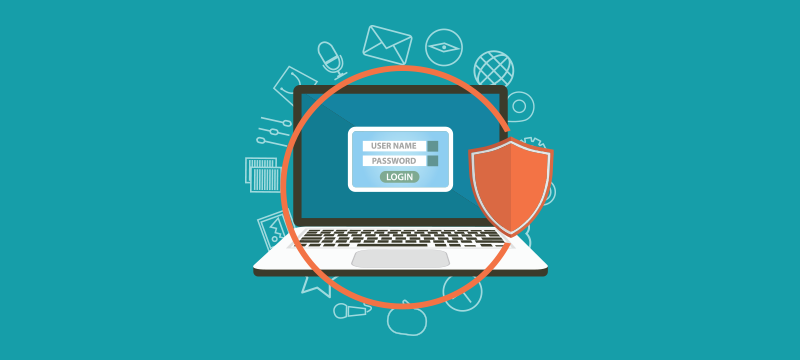Cybercriminals can infiltrate your computer, laptop, PC, and network via phishing scams, ransomware, spyware, viruses, and worms, to name just a few methods. If this happens, you and your business could suffer financially. Knowing how easily your identity can be taken by merely clicking a bad link from an email can be frightening.
There are many ways that your website can be exploited or attacked, but the good thing is that there are many methods through which you can defend your online business from cyber threats.
Strong password policy
Make it mandatory for staff to use secure credentials and to change them frequently. The simplest way to increase system security is probably to create a strong computer password. Create a complicated password using special characters like “&*$#” and ensure that the password length is at least above 8 to 10 characters.
Utilize two-factor authentication whenever and wherever practical. Regularly changing your password can help stop brute-force password attacks. In brute force assault, the software attempts multiple times to crack a target’s password and enter their computer. Your password will be more difficult to crack the stronger it is. Additionally, do not write down your passwords, or even if you do ensure that it is kept safe and confidential.
Set up an anti-virus program
An antivirus application actively searches for viruses that attempt to infiltrate your operating system (OS), email, or system files. Consider factors like the application’s features (such as regular updates) and compatibility with your laptop and PC when selecting a high-quality software package. Likewise, take into account the cost of the application. It is critical to realize that quality anti-virus software is usually not the most expensive. Free software products, however, do not offer enough security, despite being wonderful for your budget.
Set up a virus and spyware protection software
As much harm to your network as a virus can do is caused by malware and spyware. Similar characteristics to those of an anti-virus application should be present in an anti-malware and an anti-spyware program. Your computer should execute complete system scans with the help of these tools, which should also quarantine spyware and delete malware as well as routinely update lists of spyware and malware definitions.
The majority of consumers would rather just buy anti-virus software that also has spyware and malware screening and removal features, however, no one piece of software can discover and remove every piece of malware. Use multiple layers of security to protect your computer system. A software application with a specific job in hand enables a more concentrated assault against those threats.
Run complete system scans every day
Viruses, malware, and spyware are constantly advancing. In fact, they occasionally manage to get past the defenses you have placed and infect your computer system as a result. Use daily scans with your anti-spyware, anti-malware, and anti-virus applications to identify, isolate, and get rid of any harmful agents on your network before they cause any (or more) harm.
Make a timetable for routine system backups
The contents of your PC or laptop can be destroyed by a variety of hostile agents. To ensure that your data can be recovered in the event that something bad happens to your PC, create a regular backup schedule. Think about external hard drives or online storage as backup solutions. You can use a managed cloud server service to back up your online business data. Your PC can be connected to an external personal hard drive so you can manually copy your updated files.
Update your laptop and computers frequently
To fix any defects and irregularities in the computer system, it is crucial to execute routine computer system upgrades. Cybercriminals can use anomalies and flaws that remain in your system if you do not permit system updates. Make sure to accept the updates as they become available.
Ensure that you activate a firewall
A network firewall is a crucial device that creates a guard around your computers and laptops and prevents unauthorized access to your devices from the outside. Adapting the firewall settings to your tastes is possible. Utilize the operating system’s built-in firewall features while configuring or establishing a computer system.
Use caution when using the internet
Even the most secure websites can have spyware, malware, and viruses. A single mouse click is all it takes for your PC or laptop to catch a virus. Many fraudulent websites are disguised to look like legitimate ones. Verify the website’s name and proper spelling before entering any URLs. Do not click on pop-up windows, advertisements, images, or links to some other website.
Learn the fundamentals of your computer’s security
The user is the first line of defense for computers. It should be taken into consideration if your firm does not already have a security awareness application in place. Employees who have received the appropriate training can comprehend how to safeguard the computer network of their employer. Make an effort to educate yourself on the fundamentals of your computer security, it will greatly assist you in securing your network.
Conclusion
Even users who are extremely cautious run the danger of acquiring a virus. If your computer starts to run slowly, crashes frequently, or displays error notifications, then it is possible it can be a virus. Other red flags include a slow computer restart or shutdown, new toolbars that haven’t been installed, laptop battery depleting more quickly than usual, or a changing home screen.
Ensure that your security software is up to date and then scan the computer if you think that it may be affected. Follow these 9 tips mentioned above in this post to safeguard yourself. These days protecting your computer against malware and a virus is significantly simpler and doesn’t have to cost much money. Spend some time today making sure you’re covered.
